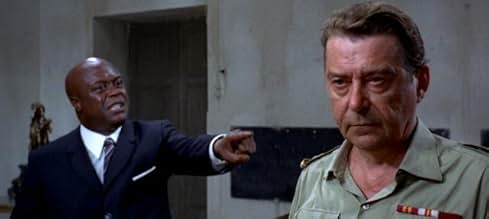Little known but terrifically effective Italian film originally titled "Seduto all sua destra" ("Seated at His Right"), but retitled in the US "Black Jesus" to take advantage of the blaxploitation film trend of the 1970s, this is not remotely a blaxploitation film. Former athlete-turned-wonderful-actor Woody Strode (best known for "Spartacus," "The Professionals," and "Sergeant Rutledge") has the most prominent role of his career as a thinly disguised Patrice Lumumba, the charismatic revolutionary of the Belgian Congo. Generally described and reviewed as a highly political film about the Belgian (and other European) exploitation of Africa, in reality this film has (maybe unintentionally) a simpler meaning at its heart: the contrast between love and cruelty. Yes, the film pits primarily "evil" Europeans against almost exclusively benign Africans. Yes, the Marxist inclinations of the filmmaker (Valerio Zurlini) are quite evident. But taken at face value, there is much less in this film about politics than there is about how casually some men can be cruel--terribly cruel--and how central to the core of what it means to be human love and mercy are. From that viewpoint, what many have pointed out as heavy-handed Christ symbolism (and it is blatant) is not so much a political point as it is a poem about the kindness that can be found in the human heart even in the most degrading circumstances. Woody Strode (even in the dubbed version) is amazing, not only for his stunning physical presence (anyone who saw his gladiator fight with Kirk Douglas in "Spartacus" knows what I'm talking about), but for the humanity that bursts from the screen whenever he is in view. This is not a film without flaws (especially in the version easily available), but it's a wonderfully effective film despite those flaws, and presents far more in a simple way than at first meets the eye.















